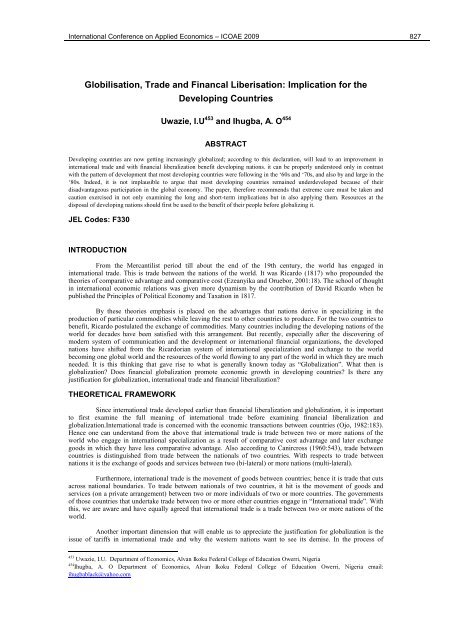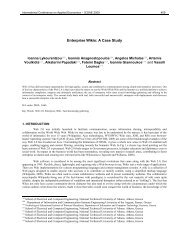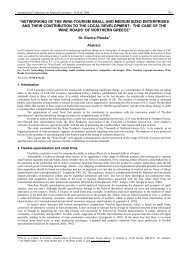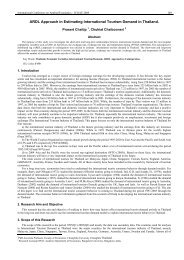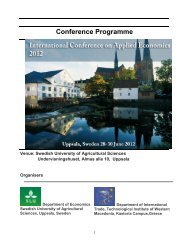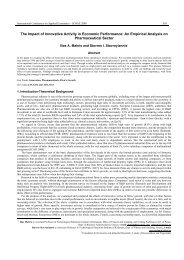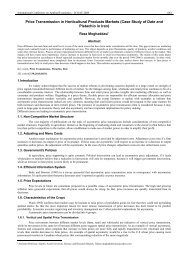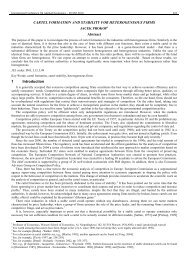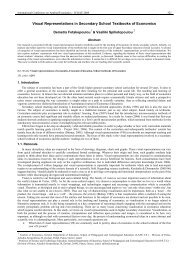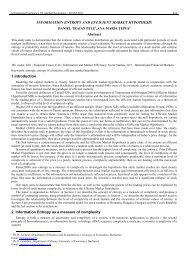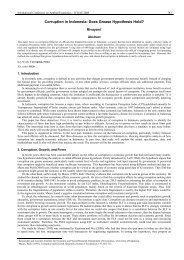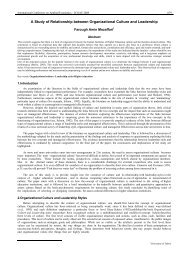Globilisation, Trade and Financal Liberisation: Implication for the ...
Globilisation, Trade and Financal Liberisation: Implication for the ...
Globilisation, Trade and Financal Liberisation: Implication for the ...
Create successful ePaper yourself
Turn your PDF publications into a flip-book with our unique Google optimized e-Paper software.
International Conference on Applied Economics – ICOAE 2009 827<br />
<strong>Globilisation</strong>, <strong>Trade</strong> <strong>and</strong> <strong>Financal</strong> <strong>Liberisation</strong>: <strong>Implication</strong> <strong>for</strong> <strong>the</strong><br />
Developing Countries<br />
Uwazie, I.U 453 <strong>and</strong> Ihugba, A. O 454<br />
ABSTRACT<br />
Developing countries are now getting increasingly globalized; according to this declaration, will lead to an improvement in<br />
international trade <strong>and</strong> with financial liberalization benefit developing nations. it can be properly understood only in contrast<br />
with <strong>the</strong> pattern of development that most developing countries were following in <strong>the</strong> ‗60s <strong>and</strong> ‗70s, <strong>and</strong> also by <strong>and</strong> large in <strong>the</strong><br />
‗80s. Indeed, it is not implausible to argue that most developing countries remained underdeveloped because of <strong>the</strong>ir<br />
disadvantageous participation in <strong>the</strong> global economy. The paper, <strong>the</strong>re<strong>for</strong>e recommends that extreme care must be taken <strong>and</strong><br />
caution exercised in not only examining <strong>the</strong> long <strong>and</strong> short-term implications but in also applying <strong>the</strong>m. Resources at <strong>the</strong><br />
disposal of developing nations should first be used to <strong>the</strong> benefit of <strong>the</strong>ir people be<strong>for</strong>e globalizing it.<br />
JEL Codes: F330<br />
INTRODUCTION<br />
From <strong>the</strong> Mercantilist period till about <strong>the</strong> end of <strong>the</strong> 19th century, <strong>the</strong> world has engaged in<br />
international trade. This is trade between <strong>the</strong> nations of <strong>the</strong> world. It was Ricardo (1817) who propounded <strong>the</strong><br />
<strong>the</strong>ories of comparative advantage <strong>and</strong> comparative cost (Ezeanyika <strong>and</strong> Oruebor, 2001:18). The school of thought<br />
in international economic relations was given more dynamism by <strong>the</strong> contribution of David Ricardo when he<br />
published <strong>the</strong> Principles of Political Economy <strong>and</strong> Taxation in 1817.<br />
By <strong>the</strong>se <strong>the</strong>ories emphasis is placed on <strong>the</strong> advantages that nations derive in specializing in <strong>the</strong><br />
production of particular commodities while leaving <strong>the</strong> rest to o<strong>the</strong>r countries to produce. For <strong>the</strong> two countries to<br />
benefit, Ricardo postulated <strong>the</strong> exchange of commodities. Many countries including <strong>the</strong> developing nations of <strong>the</strong><br />
world <strong>for</strong> decades have been satisfied with this arrangement. But recently, especially after <strong>the</strong> discovering of<br />
modern system of communication <strong>and</strong> <strong>the</strong> development or international financial organizations, <strong>the</strong> developed<br />
nations have shifted from <strong>the</strong> Ricardorian system of international specialization <strong>and</strong> exchange to <strong>the</strong> world<br />
becoming one global world <strong>and</strong> <strong>the</strong> resources of <strong>the</strong> world flowing to any part of <strong>the</strong> world in which <strong>the</strong>y are much<br />
needed. It is this thinking that gave rise to what is generally known today as ―Globalization‖. What <strong>the</strong>n is<br />
globalization? Does financial globalization promote economic growth in developing countries? Is <strong>the</strong>re any<br />
justification <strong>for</strong> globalization, international trade <strong>and</strong> financial liberalization?<br />
THEORETICAL FRAMEWORK<br />
Since international trade developed earlier than financial liberalization <strong>and</strong> globalization, it is important<br />
to first examine <strong>the</strong> full meaning of international trade be<strong>for</strong>e examining financial liberalization <strong>and</strong><br />
globalization.International trade is concerned with <strong>the</strong> economic transactions between countries (Ojo, 1982:183).<br />
Hence one can underst<strong>and</strong> from <strong>the</strong> above that international trade is trade between two or more nations of <strong>the</strong><br />
world who engage in international specialization as a result of comparative cost advantage <strong>and</strong> later exchange<br />
goods in which <strong>the</strong>y have less comparative advantage. Also according to Canircross (1960:543), trade between<br />
countries is distinguished from trade between <strong>the</strong> nationals of two countries. With respects to trade between<br />
nations it is <strong>the</strong> exchange of goods <strong>and</strong> services between two (bi-lateral) or more nations (multi-lateral).<br />
Fur<strong>the</strong>rmore, international trade is <strong>the</strong> movement of goods between countries; hence it is trade that cuts<br />
across national boundaries. To trade between nationals of two countries, it hit is <strong>the</strong> movement of goods <strong>and</strong><br />
services (on a private arrangement) between two or more individuals of two or more countries. The governments<br />
of those countries that undertake trade between two or more o<strong>the</strong>r countries engage in ―International trade‖. With<br />
this, we are aware <strong>and</strong> have equally agreed that international trade is a trade between two or more nations of <strong>the</strong><br />
world.<br />
Ano<strong>the</strong>r important dimension that will enable us to appreciate <strong>the</strong> justification <strong>for</strong> globalization is <strong>the</strong><br />
issue of tariffs in international trade <strong>and</strong> why <strong>the</strong> western nations want to see its demise. In <strong>the</strong> process of<br />
453 Uwazie, I.U. Department of Economics, Alvan Ikoku Federal College of Education Owerri, Nigeria<br />
454 Ihugba, A. O Department of Economics, Alvan Ikoku Federal College of Education Owerri, Nigeria email:<br />
ihugbablack@yahoo.com
828 International Conference on Applied Ecomonics – ICOAE 2009<br />
producing <strong>the</strong>se goods <strong>and</strong> services, costs are incurred. To import <strong>and</strong> export <strong>the</strong>se goods, many countries charge<br />
tariffs. Also developing countries use tariffs as a means of protecting <strong>the</strong>ir economy from <strong>the</strong> importation of all<br />
sorts of commodities. it also enables <strong>the</strong>m to protect <strong>the</strong>ir infant industries that cannot compete with <strong>the</strong>ir<br />
counterparts in advanced countries. With <strong>the</strong> above arrangement, western nations started with <strong>the</strong> idea of<br />
international financial liberalization. Be<strong>for</strong>e liberalization came into being international financial institutions,<br />
which as we know are agents of developed nations, started with Structural Adjustment Programme to help to<br />
revamp <strong>the</strong> economy of developing nations. One of <strong>the</strong> tenets of <strong>the</strong> Structural Adjustment Programme was <strong>the</strong><br />
issue of de-regulation with its attendant privatization <strong>and</strong> commercialization.<br />
According to western experts, this will enable capital to flow into <strong>the</strong> economies of developing nations<br />
<strong>and</strong> hence, <strong>the</strong> growth of <strong>the</strong>ir economy. To this end, <strong>the</strong>y called <strong>for</strong> <strong>the</strong> dismantling of all artificial barriers to<br />
trade so that international finance could flow to help <strong>the</strong><br />
infant industries to grow. That was what gave rise to international financial liberalization. Ezeanyika <strong>and</strong><br />
Oruebor (2001:150) described international financial liberalization as one of <strong>the</strong> major aspects of globalization –<br />
<strong>the</strong> process of financial liberalization has been <strong>the</strong> most articulated. They <strong>the</strong>re<strong>for</strong>e saw international financial<br />
liberation as <strong>the</strong> process of making finance available to any part of <strong>the</strong> world that it is needed. What <strong>the</strong>re<strong>for</strong>e can<br />
be appreciated from <strong>the</strong> above is that international financial liberalization is one of those promises made to <strong>the</strong><br />
developing <strong>and</strong> underdeveloped nations to enable <strong>the</strong>m remove tariffs so hat <strong>for</strong>eign goods can be flooded into<br />
<strong>the</strong>ir countries <strong>the</strong>reby stifling <strong>the</strong>ir nascent industries.<br />
Also, it is important <strong>for</strong> us to appreciate <strong>the</strong> meaning of globalization, as this will finally enable us to<br />
justify or not justify <strong>the</strong> concept of globalization <strong>and</strong> what it portends <strong>for</strong> developing nations.<br />
Globalization or (globalisation) in its literal sense is <strong>the</strong> process of making, trans<strong>for</strong>mation of some<br />
things or phenomena into global ones. It can be described as a process by which <strong>the</strong> people of <strong>the</strong> world are<br />
unified into a single society <strong>and</strong> function toge<strong>the</strong>r. This process is a combination of economic, technological,<br />
sociocultural <strong>and</strong> political <strong>for</strong>ces Croucher (2004).<br />
According to Ezeanyika <strong>and</strong> Oruebor (2001:140) <strong>the</strong> concept of globalization refers to ―an increasing<br />
flow of goods <strong>and</strong> resources across national boundaries, <strong>and</strong> <strong>the</strong> emergence of a complementary set of<br />
organizational structures to manage <strong>the</strong> exp<strong>and</strong>ing network of international economic activity <strong>and</strong> transaction‖.<br />
Put differently, <strong>the</strong>y also stated that it is a global economy in which corporations <strong>and</strong> financial institutions operate<br />
transnational i.e. beyond <strong>the</strong> confines of national boundaries.<br />
Also, Heald et.al (1999) sees globalization as a process of ―global trans<strong>for</strong>mers‖. It could, <strong>the</strong>re<strong>for</strong>e be<br />
referred to as <strong>the</strong> historical epochs or to <strong>the</strong> various domains of activity affected <strong>and</strong> influenced by<br />
trans<strong>for</strong>mations, or to both (see Ezeanyika et al op cit p.142).<br />
According to Oniemola (2000:19) ―Globalization is nothing but <strong>the</strong> opening up of our economy <strong>for</strong><br />
investment by <strong>the</strong> developed countries <strong>and</strong> deregulation in such a way that <strong>the</strong>re should be no barriers or control of<br />
<strong>the</strong> economy in such a way as <strong>the</strong>y may wish <strong>and</strong> repatriate <strong>the</strong>ir profits as <strong>the</strong>y wish. He <strong>the</strong>re<strong>for</strong>e concluded that<br />
this is causing a high level of poverty in <strong>the</strong> l<strong>and</strong> <strong>and</strong> should not be swallowed just like that. He <strong>the</strong>n cautioned<br />
developing nations to be weary about anything that comes out of <strong>the</strong> western nations.<br />
IMPLICATIONS OF GLOBALIZATION, INTERNATIONALTRADE, AND INTERNATIONAL<br />
FINANCIAL LIBERALIZATION<br />
At this point, one might simply ask, ―can anything good in terms of international business relationship,<br />
ever come out from <strong>the</strong> developed nations? Have <strong>the</strong> developing nations ever benefited from any kind of trade<br />
policy packaged by <strong>the</strong> developed nations? What <strong>the</strong>n are <strong>the</strong> implications of developing countries embracing<br />
globalization <strong>and</strong> its twin evil, financial liberalization? Because <strong>the</strong> main export of poorer countries are usually<br />
agricultural goods. It is difficult <strong>for</strong> <strong>the</strong>se countries to compete with stronger countries that subsidize <strong>the</strong>ir own<br />
farmers. Because <strong>the</strong> farmers in <strong>the</strong> poorer countries cannot compete, <strong>the</strong>y are <strong>for</strong>ced to sell <strong>the</strong>ir crops at much<br />
lower price than what <strong>the</strong> market is paying<br />
Be<strong>for</strong>e giving <strong>the</strong> answer to <strong>the</strong>se questions, one has to define <strong>the</strong> services that can be traded<br />
internationally. According to Lehmann, Tamirisa, <strong>and</strong> Wieczorek (2003:4) They include a variety of highly<br />
heterogeneous economic activities which can be classified into distributive services (wholesale <strong>and</strong> retail,<br />
transportation <strong>and</strong> communications), producer services (advisory, legal services, banking <strong>and</strong> finance), social<br />
services (health <strong>and</strong> education), <strong>and</strong> personal services (hotels <strong>and</strong> catering). Services are often intermediate inputs,<br />
<strong>and</strong> thus play a key role in <strong>the</strong> efficiency of <strong>the</strong> manufacturing sector <strong>and</strong> <strong>the</strong> economy as a whole. Public<br />
regulation is more pervasive than in o<strong>the</strong>r sectors, <strong>and</strong> motivated by asymmetric in<strong>for</strong>mation between providers<br />
<strong>and</strong> consumers, competition policy, <strong>and</strong> o<strong>the</strong>r policy objectives, such as universal service requirements in a<br />
number of social services.<br />
Globalization portends danger <strong>for</strong> <strong>the</strong> developing countries. A situation in which <strong>the</strong> developing<br />
countries could be asked to open up <strong>the</strong>ir borders <strong>for</strong> <strong>the</strong> importation of any kind or product implies that all infant<br />
industries in those countries will close-down. Not only this, <strong>the</strong> level of unemployment will become so high that<br />
crime rate will hit <strong>the</strong> roof tops.
International Conference on Applied Economics – ICOAE 2009 829<br />
As a result of <strong>the</strong> above, <strong>the</strong> western countries that are clamoring <strong>for</strong> <strong>the</strong> total <strong>and</strong> complete removal of<br />
any kind of trade restriction are not fair to <strong>the</strong> developing countries because it breeds exploitation of <strong>the</strong> people in<br />
those nations to become cheap labor. Due to <strong>the</strong> lack of protections, companies from powerful industrialized<br />
nations are able to offer workers enough salary to entice <strong>the</strong>m to endure extremely long hours <strong>and</strong> unsafe working<br />
conditions. The abundance of cheap labor is giving <strong>the</strong> countries in power incentive not to rectify <strong>the</strong> inequality<br />
between nations. If <strong>the</strong>se nations developed into industrialized nations, <strong>the</strong> army of cheap labor would slowly<br />
disappear alongside development. With <strong>the</strong> world in this current state, it is impossible <strong>for</strong> <strong>the</strong> exploited workers to<br />
escape poverty. It is true that <strong>the</strong> workers are free to leave <strong>the</strong>ir jobs, but in many poorer countries, this would<br />
mean starvation <strong>for</strong> <strong>the</strong> worker, <strong>and</strong> possible even his/her family Chossudovsky (2003). There is <strong>the</strong>re<strong>for</strong>e no<br />
justification <strong>for</strong> <strong>the</strong> adoption of globalization <strong>and</strong> international financial liberalization.<br />
What <strong>the</strong> developed nations should do is to encourage <strong>the</strong> developing nations to develop <strong>the</strong>ir industrial<br />
base <strong>and</strong> open up <strong>the</strong>ir own markets <strong>for</strong> products manufactured in less developed countries. To this extent<br />
<strong>the</strong>re<strong>for</strong>e, globalization implies economic disaster <strong>for</strong> developing nations <strong>and</strong> hence, <strong>the</strong>re is no basis <strong>for</strong> its<br />
justification. The implication of globalization <strong>and</strong> <strong>the</strong> so-called financial developing nations‖ <strong>and</strong> Arigbede<br />
(2000:19) reviews it this way, ―do away with liberalization <strong>and</strong> globalization <strong>and</strong> poverty will be eradicated‖.<br />
In his own contribution, Nwosu (2000:386) stated that, ―<strong>the</strong> central problem with this accelerated<br />
globalization <strong>and</strong>//or liberalization process is <strong>the</strong> shocking degree of inequality <strong>and</strong> economic <strong>and</strong> cultural<br />
domination which it unleashes worldwide‖. That what we actually require is nothing but harnessing our God-given<br />
resources <strong>for</strong> <strong>the</strong> betterment of <strong>the</strong> lives of our people.<br />
GLOBALIZATION AND FINANCIAL LIBERALIZATION: ANY RELATIONSHIP?<br />
Many writers on international trade especially of recent, can readily tell you that <strong>the</strong>re is a high <strong>and</strong><br />
positive correlation <strong>and</strong>/or relationship between international trade, liberalization (be it financial or whatever) <strong>and</strong><br />
<strong>the</strong> present drive to make <strong>the</strong> world to become <strong>the</strong> so-called ―global village‖. Writing on <strong>the</strong> evolution of<br />
globalization, Ezeanyika <strong>and</strong> Oruebor (2001:142) exposed <strong>the</strong> link between <strong>the</strong> General Agreement on <strong>Trade</strong> <strong>and</strong><br />
Tariffs (GATT), <strong>the</strong> World <strong>Trade</strong> Organization (WTO), Structural Adjustment Programme (SAP) <strong>and</strong> <strong>the</strong> present<br />
globalization. All are <strong>the</strong> same fingers of a leprous h<strong>and</strong>. No wonder Rist (1979) <strong>and</strong> Sharp (1979) stated that,<br />
―despite <strong>the</strong> numerous ef<strong>for</strong>ts, made in order to develop‖ <strong>the</strong> poorest regions of <strong>the</strong> world, <strong>the</strong> majority of <strong>the</strong><br />
people who are living in it tend to <strong>the</strong> world, <strong>the</strong> majority of <strong>the</strong> people who are living in it tend to become still<br />
poorer in relative <strong>and</strong> in absolute terms‖. What we are made to underst<strong>and</strong> here is that despite <strong>the</strong> introduction of<br />
so many policies <strong>and</strong> programmes by <strong>the</strong> so-called international community, purportedly designed to help <strong>the</strong><br />
poore4r countries to grow, <strong>the</strong>y have even become poorer by all st<strong>and</strong>ards. Hence globalization that is presently<br />
being b<strong>and</strong>ied about, financial liberalization <strong>and</strong> even international trade, are <strong>the</strong> same designed <strong>and</strong> used in<br />
underdevelopment of third world countries. Hence all are related both in content <strong>and</strong> in purpose.<br />
Apart <strong>for</strong>m <strong>the</strong> above fact, which has exposed <strong>the</strong> treacherous act of western nations, we have also<br />
observed that when <strong>the</strong> so-called Structural Adjustment Programme was introduced in <strong>the</strong> 1980‘s, it was greeted<br />
by much fanfare by <strong>the</strong> western economists as a means of getting to <strong>the</strong> Promised L<strong>and</strong>. Yet, nothing came out of<br />
it. The same was applicable to privatization, commercialization, liberalization, etc. <strong>the</strong> same thing will be<br />
applicable to globalization. This is because all are designed with <strong>the</strong> purpose of keeping developing nations worse<br />
than <strong>the</strong>y were be<strong>for</strong>e. Hence, we can conclude that all are <strong>the</strong> same thing.<br />
MEASURING GLOBALIZATION<br />
Globalization can be measured around <strong>the</strong> four main economic flows that characterize globalization:<br />
Goods <strong>and</strong> services, e.g. exports plus imports as a proportion of national income or per capita of population<br />
Labor/people, e.g. net migration rates; inward or outward migration flows, weighted by population; Capital, e.g.<br />
inward or outward direct investment as a proportion of national income or per head of population; Technology,<br />
e.g. international research & development flows; proportion of populations (<strong>and</strong> rates of change <strong>the</strong>reof) using<br />
particular inventions (especially 'factor-neutral' technological advances such as <strong>the</strong> telephone, motorcar,<br />
broadb<strong>and</strong>).
830 International Conference on Applied Ecomonics – ICOAE 2009<br />
Table 1: Foreign Direct Investment (FDI) Overview, Selected Years<br />
FDI Flows 1990-2000 2003 2004 2005 2006<br />
Nigeria<br />
Inward<br />
Outward<br />
Germany<br />
Inward<br />
Outward<br />
China<br />
Inward<br />
Outward<br />
United Kingdom<br />
Inward<br />
Outward<br />
France<br />
Inward<br />
Outward<br />
Singapore<br />
Inward<br />
Outward<br />
United states<br />
Inward<br />
Outward<br />
Japan<br />
Inward<br />
Outward<br />
1477<br />
302<br />
29354<br />
44323<br />
30104<br />
2195<br />
40321<br />
73378<br />
22611<br />
47659<br />
9204<br />
4757<br />
109513<br />
92010<br />
3149<br />
25409<br />
2171<br />
167<br />
32369<br />
5822<br />
53505<br />
2855<br />
16778<br />
62187<br />
42498<br />
53147<br />
11664<br />
2695<br />
53146<br />
129352<br />
6324<br />
28800<br />
Kenya<br />
Inward<br />
29<br />
82<br />
Outward<br />
3<br />
2<br />
Source: UNCTAD, World Investment Report 2007<br />
2127<br />
261<br />
-9195<br />
14828<br />
60630<br />
5498<br />
55963<br />
91019<br />
32560<br />
56735<br />
19828<br />
8074<br />
135826<br />
257967<br />
7816<br />
30951<br />
46<br />
4<br />
3403<br />
200<br />
35867<br />
55515<br />
72406<br />
12261<br />
193693<br />
83708<br />
81083<br />
120971<br />
15004<br />
5034<br />
101025<br />
-27736<br />
2775<br />
45781<br />
21<br />
10<br />
5445<br />
228<br />
42870<br />
79427<br />
69468<br />
16130<br />
139543<br />
79457<br />
81076<br />
115037<br />
24207<br />
8626<br />
175394<br />
216614<br />
-6506<br />
50266<br />
According to <strong>the</strong> United Nations, Foreign direct investment (FDI) in its classic definition is defined as a<br />
company from one country making a physical investment into building a factory in ano<strong>the</strong>r country. Its definition<br />
can be extended to include investments made to acquire lasting interest in enterprises operating outside of <strong>the</strong><br />
economy of <strong>the</strong> investor. Inward <strong>for</strong>eign direct investment is a particular <strong>for</strong>m of inward investment when <strong>for</strong>eign<br />
capital is invested in local resources while outward <strong>for</strong>eign direct investment, sometimes called "direct investment<br />
abroad", is when local capital is invested in <strong>for</strong>eign resources.<br />
This type of investment plays an extraordinary <strong>and</strong> growing role in global business, in <strong>the</strong> o<strong>the</strong>r h<strong>and</strong><br />
investment is a function of capital. According to table 1, Kenya <strong>and</strong> Nigeria are <strong>the</strong> least globalized, when it<br />
comes to outward <strong>for</strong>eign direct investment among countries listed while United States is <strong>the</strong> highest in terms of<br />
inward <strong>for</strong>eign direct investment. This goes a long way to buttress our st<strong>and</strong> on globalization that unrestricted free<br />
trade benefits those with more financial leverage (i.e. <strong>the</strong> rich) at <strong>the</strong> expense of <strong>the</strong> poor. Majority of <strong>the</strong> inward<br />
<strong>for</strong>eign direct investment into US <strong>and</strong> UK are from industrialized nations, who have enough legitimate capital to<br />
invest outside <strong>the</strong>ir country not from African countries where monies sent abroad are ill gotten <strong>and</strong> hidden in<br />
<strong>for</strong>eign banks.<br />
51<br />
24
International Conference on Applied Economics – ICOAE 2009 831<br />
Table 2: Cross-Border Merger <strong>and</strong> Acquisition Overview, 1990-2006<br />
Sales Purchases<br />
1990-2000 2004 2005 2006 1990-<br />
2000<br />
2004 2005 2006<br />
Nigeria - 10 43 28383 2 - - 21<br />
United<br />
states<br />
36118 81939 105560 172174 27256 110022 147551 171288<br />
Europe 56362 185809 445126 451288 66085 176095 413405 483637<br />
Africa 651 4595 10509 17569 1266 2718 15505 11208<br />
Asia <strong>and</strong> 4757 24820 59450 72240 5531 20604 53601 79789<br />
Oceania<br />
World 117889 380598 716302 880457 117889 380598 716302 880457<br />
Source: UNCTAD, World Investment Report 2007<br />
Table 2 also shows <strong>the</strong> level of globalization in terms of cross- boarder merger <strong>and</strong> acquisition. In 2006<br />
Nigeria recorded only 21 cross- border mergers <strong>and</strong> acquisition while US recorded 171288, a difference of<br />
171267. in 2006, Africa contributed only 1.3% of <strong>the</strong> world cross-boarder merger <strong>and</strong> acquisition while United<br />
States alone contributed 19.5%, which is more than <strong>the</strong> whole of Africa. See table 2.<br />
ANY JUSTIFICATION FOR GLOBALIZATION?<br />
Admired <strong>and</strong> academic literature has sufficiently addressed <strong>the</strong> scope <strong>and</strong> complexity of globalization,<br />
its assumptions, goals, strictures, <strong>and</strong> processes. Issues associated with human rights, labor conditions <strong>and</strong><br />
compensation, environmental protection, national sovereignty, poverty, investment patterns <strong>and</strong> productivity are<br />
among <strong>the</strong> many concerns embedded in <strong>the</strong> broad <strong>the</strong>me of globalization. Analysts from a number of disciplines<br />
<strong>and</strong> political persuasions approach globalization from a variety of perspectives Garofalo (2002). Often <strong>the</strong>y see<br />
globalization as ei<strong>the</strong>r <strong>the</strong> inevitable next step in human progress or <strong>the</strong> evil free-trade juggernaut that threatens<br />
<strong>the</strong> future of most of humanity. What <strong>the</strong>y tend to omit from <strong>the</strong>se discussions, however, is an explicit concern <strong>for</strong><br />
<strong>the</strong> underlying moral basis <strong>and</strong> justification <strong>for</strong> globalization <strong>and</strong> <strong>the</strong> particular role of public administrators across<br />
<strong>the</strong> planet.<br />
To <strong>the</strong> best of our knowledge <strong>and</strong> based on <strong>the</strong> facts so far made available in this paper, <strong>the</strong>re is no<br />
justification <strong>for</strong> globalization <strong>and</strong> <strong>for</strong> international financial liberalization, if anything is to go by <strong>the</strong> antecedents<br />
of <strong>the</strong> western nations, i.e. unfavourable economic policies designed to fur<strong>the</strong>r impoverish developing nations.<br />
One of <strong>the</strong> reasons why <strong>the</strong>re is no justification is this; why did <strong>the</strong> western nations not consult <strong>the</strong> third<br />
world countries be<strong>for</strong>e coming out with <strong>the</strong> idea <strong>and</strong> <strong>the</strong> so-called ideals of globalization? If <strong>the</strong>y did really mean<br />
well <strong>for</strong> <strong>the</strong> developing nations, why did <strong>the</strong>y not consult <strong>the</strong>m <strong>for</strong> a policy that would eventually affect <strong>the</strong>m?<br />
Apart from that, why are <strong>the</strong> developed nations trying to <strong>for</strong>ce down this policy on <strong>the</strong> throats of <strong>the</strong> developing<br />
nations. Many developing countries (that have smelt <strong>the</strong> rat), have been threatened with sanctions or withdrawal of<br />
development aid. If <strong>the</strong> developed nations were sincere, <strong>the</strong>n <strong>the</strong>re would have been worldwide consultations<br />
mainly on non-consultation <strong>and</strong> <strong>the</strong> incessant threats by <strong>the</strong> developed countries, globalization <strong>and</strong> its financial<br />
liberalization is hereby rejected <strong>and</strong> hence, <strong>the</strong>re is no justification <strong>for</strong> it.<br />
EFFECTS OF GLOBALIZATION<br />
Globalization has various aspects which affect <strong>the</strong> world in several different ways such as Industrial,<br />
Financial, Economic, Political, In<strong>for</strong>mational, Cultural, Ecological, Social, Transportation, Technical etc. our<br />
interest is <strong>the</strong> effect on developing nations such as Nigeria.<br />
Financial globalization, in combination with good macroeconomic policies <strong>and</strong> good domestic<br />
governance, appears to be conducive to growth. For example, countries with good human capital <strong>and</strong> governance<br />
tend to do better at attracting <strong>for</strong>eign direct investment (FDI), which is especially conducive to growth. More<br />
specifically, research by IMF (2003) shows that corruption has a strong negative effect on FDI inflows. Similarly,<br />
transparency of government operations, which is ano<strong>the</strong>r dimension of good governance, has a strong positive<br />
effect on investment inflows from international mutual funds. Emergence of worldwide production markets <strong>and</strong><br />
broader access to a range of <strong>for</strong>eign products <strong>for</strong> consumers <strong>and</strong> companies. Particularly movement of material<br />
<strong>and</strong> goods between <strong>and</strong> within transnational corporations, <strong>and</strong> access to goods by wealthier nations <strong>and</strong> individuals<br />
at <strong>the</strong> expense of poorer nations <strong>and</strong> individuals who supply <strong>the</strong> labour.<br />
Globalization enables world governments to regulate <strong>the</strong> relationships among nations <strong>and</strong> guarantees <strong>the</strong><br />
rights arising from social <strong>and</strong> economic responsibilities. Politically, <strong>the</strong> United States has enjoyed a position of<br />
power among <strong>the</strong> world powers; in part because of its strong <strong>and</strong> wealthy economy. With <strong>the</strong> influence of<br />
Globalization <strong>and</strong> with <strong>the</strong> help of The United States‘ own economy, China <strong>and</strong> Japan has experienced some
832 International Conference on Applied Ecomonics – ICOAE 2009<br />
tremendous growth within <strong>the</strong> past decade. See table 1. According to Hurst (6th edition) If China continues to<br />
grow at <strong>the</strong> rate projected by <strong>the</strong> trends, <strong>the</strong>n it is very likely that in <strong>the</strong> next twenty years, <strong>the</strong>re will be a major<br />
reallocation of power among <strong>the</strong> world leaders. China will have enough wealth, industry, <strong>and</strong> technology to rival<br />
<strong>the</strong> United States <strong>for</strong> <strong>the</strong> position of leading world power. Globalization has brought about an increase in <strong>the</strong><br />
consumption of <strong>for</strong>eign products (e.g. food) <strong>and</strong> ideas by <strong>the</strong> developing countries, advent of new categories of<br />
consciousness <strong>and</strong> identities which embodies cultural diffusion, <strong>and</strong>, adopts new technology <strong>and</strong> practices, <strong>and</strong><br />
participates in a "world culture"; loss of languages (<strong>and</strong> corresponding loss of ideas).<br />
Ecologically, globalization <strong>and</strong> free trade interplay to increase pollution <strong>and</strong> accelerate it in <strong>the</strong> name of<br />
an ever exp<strong>and</strong>ing capitalist growth economy in a non-exp<strong>and</strong>ing world. The detriment is again to <strong>the</strong> poorer<br />
nations while <strong>the</strong> benefit is allocated to <strong>the</strong> wealthier nations. Globalization has brought about an increase in <strong>the</strong><br />
use of <strong>for</strong>eign assembled cars in Nigeria, increase in circulation by people from <strong>the</strong> developing countries to<br />
developed countries to work as slaves <strong>and</strong> fewer restrictions on those from <strong>the</strong> developed countries to <strong>the</strong><br />
developing countries, Provided that <strong>the</strong> people of those nations are wealthy enough to af<strong>for</strong>d international travel.<br />
Finally, globalization has increased concentration of wealth in fewer <strong>and</strong> fewer h<strong>and</strong>s. Media <strong>and</strong> o<strong>the</strong>r<br />
multinational mergers leading to fewer corporations controlling vaster segments of society <strong>and</strong> production. The<br />
decrease in <strong>the</strong> middle class <strong>and</strong> <strong>the</strong> increase in poverty observed within Globalized <strong>and</strong> deregulated nations.<br />
THE WAY FORWARD/RECOMMENDATIONS<br />
It was Nwosu (2000) who stated emphatically that <strong>the</strong>re is only one way <strong>for</strong>ward <strong>for</strong> third world <strong>and</strong><br />
developing nations of <strong>the</strong> world, research <strong>and</strong> development, harnessing <strong>the</strong>ir God given natural resources <strong>for</strong> <strong>the</strong><br />
good of <strong>the</strong>ir people <strong>and</strong> finally a good government.<br />
With this in mind, developing countries have been called upon to rally toge<strong>the</strong>r <strong>and</strong> stop <strong>the</strong> idea of <strong>the</strong><br />
advanced nations imposing any kind of policy on <strong>the</strong>m without due consultation. The G77 made up of developing<br />
nation should pull resources toge<strong>the</strong>r <strong>and</strong> help one ano<strong>the</strong>r in <strong>the</strong> areas of industrial development. Anything shot of<br />
cooperation, sincerity of purpose, honesty <strong>and</strong> dedication to genuine development of <strong>the</strong>ir economies by<br />
developing countries will always see <strong>the</strong> advanced nations imposing policies <strong>and</strong> programmes that will only<br />
benefit <strong>the</strong>m.<br />
This paper is <strong>the</strong>re<strong>for</strong>e of <strong>the</strong> view that <strong>the</strong>re is no justification <strong>for</strong> globalization at this time in <strong>the</strong><br />
development of <strong>the</strong> developing nations. If <strong>the</strong> western world is desirous of making <strong>the</strong> world one global economy,<br />
this paper is recommending that <strong>the</strong>y should wait until we are industrially advanced as <strong>the</strong>y are.<br />
CONCLUSION<br />
What really encourages globalization is a combination of good Macroeconomic policies <strong>and</strong> good<br />
domestic governance, For example, countries with good human capital <strong>and</strong> governance tend to do better at<br />
attracting <strong>for</strong>eign direct investment (FDI), which is especially conducive to growth <strong>and</strong> seriously lacking in most<br />
developing countries.<br />
Having critically analyzed this issue, which is about <strong>the</strong> justification of globalization, we are concluding<br />
that applying globalization without taking into consideration <strong>the</strong> economic background of developing nations will<br />
only ruin <strong>the</strong>ir already battered economy <strong>and</strong> <strong>the</strong>re<strong>for</strong>e, <strong>the</strong>re is no justification <strong>for</strong> <strong>the</strong> (whole) nations of <strong>the</strong><br />
world becoming one global village (in terms of international trade). That <strong>the</strong> basis of becoming one global village<br />
is one-sided <strong>and</strong> <strong>the</strong>re<strong>for</strong>e <strong>the</strong>re is no justification whatsoever <strong>for</strong> it. We strongly argue that globalization has<br />
brought about conflicts between <strong>the</strong> developing nations <strong>and</strong> <strong>the</strong> developed nations, so it should not be shoved<br />
aside as ano<strong>the</strong>r bureaucratic policy <strong>for</strong>ced upon us by <strong>the</strong> western world. When values conflict, it should be<br />
honestly discussed by all stake holders so that it can provide citizens <strong>the</strong> knowledge <strong>and</strong> in<strong>for</strong>mation needed to<br />
make intelligent judgments about <strong>the</strong> process of globalization.<br />
REFERENCES<br />
Alex<strong>and</strong>er Lehmann, Natalia T. Tamirisa, <strong>and</strong> Jaroslaw Wieczorek1, (Dec 2003); IMF Policy Discussion Paper<br />
Policy Development <strong>and</strong> Review Department International <strong>Trade</strong> in Services: <strong>Implication</strong>s <strong>for</strong> <strong>the</strong> IMF<br />
Arigbede, S. (2000) ―… Do Away with it <strong>and</strong> Poverty will be Eradicated‖ Lagos, The Post Express, Wednesday,<br />
July 12.<br />
Canicross, A. (1960) Introduction to Economics (3rd edition), Londong, Butter worth & Co (publishers) Ltd.<br />
Charles Garofalo (2002) Globalization, Moral Justification, And The PublicService;Department of Public<br />
Administration Southwest Texas State University Public Administration & Management: An Interactive Journal<br />
7, 1, 56-70<br />
Chossudovsky, Michel.(2003) The globalization of poverty <strong>and</strong> <strong>the</strong> new world order. Edition 2nd ed. Imprint<br />
Shanty Bay, Ont.: Global Outlook.
International Conference on Applied Economics – ICOAE 2009 833<br />
Ezeanyika, E.S. & Oruebor, A.A. (2001) International economic Relations in a globalizing world, Owerri Desrele<br />
Publishers.<br />
Heald, D; McGrew, A.J; Goldblatt, D & Perraton, J. (1999)b Global Cambridge <strong>and</strong> Ox<strong>for</strong>d, Polity Press.<br />
Nwosu, E.J (2000): The Challenge of Poverty in Africa, Owerri, treasure Books, skill Mark Media Ltd.<br />
Ojo, O. (1982), Advanced Level Economics Textbook <strong>for</strong> W/Africa. Ile Ife, Oniboneje Press & Books Ind. (Nig.)<br />
Ltd.<br />
Oniemola, D. (2000) ―Globalization & <strong>Trade</strong> liberalization is a Trap‖ Lagos, <strong>the</strong> Post Express, Wednesday, July<br />
12.<br />
Rist, G. (1979): ―Alternative Strategies to Development, goals Processes <strong>and</strong> Indicators of Development‖ U.N.<br />
University general Mimeo.<br />
Sharp, R. (1971): ―Towards A. New Model of Development‖ In Popull, Vol. 6, No.2.<br />
Sheila L. Croucher (2004). Globalization <strong>and</strong> Belonging: The Politics of Identity a Changing World. Rowman &<br />
Littlefield. p.10 http://www.worldfederalistmanifesto.com
834 International Conference on Applied Ecomonics – ICOAE 2009


